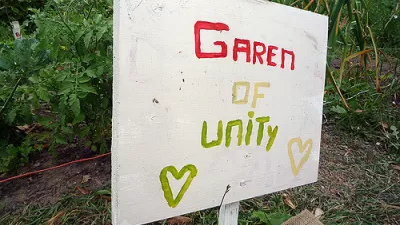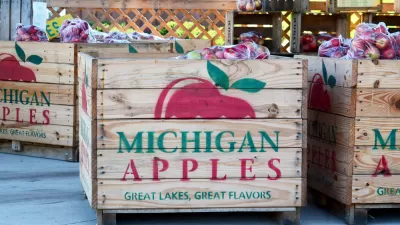Whether through community gardening or high-tech "vertical farms" interest is growing in urban agriculture.
"More and more urban agriculture projects are springing up throughout the country. When Taja Sevelle moved to Detroit in 2005 and saw the hunger, vacant lots and health problems associated with lack of fresh food, she decided that growing food on unused land was the answer. Her organization, Urban Farming, now has about 600 community gardens, many of them in Detroit, but throughout the United States and the world as well. Its lofty mission is to 'eradicate hunger.'
This may seem daunting, but Executive Director Sevelle, who studied to be a botanist before signing a record contract with Prince, thinks this is a reachable goal. She points to the success of the victory gardens and says her organization fed about a quarter of a million people in Detroit last year.
Urban farming the way Columbia University professor Dickson Despommier envisions it includes grains. Despommier and his graduate students in a medical ecology class came up with a plan they call vertical farming, which would allow farming in high-rises. Growing food locally would undoubtedly save on transportation, says Bruce Bugbee, a professor of crop physiology at Utah State University. But he scoffs at the rice-in-the-sky idea because he believes the energy costs of growing food indoors are far too great."
FULL STORY: Will Cities Soon Be Able to Feed Themselves?

Planetizen Federal Action Tracker
A weekly monitor of how Trump’s orders and actions are impacting planners and planning in America.

Maui's Vacation Rental Debate Turns Ugly
Verbal attacks, misinformation campaigns and fistfights plague a high-stakes debate to convert thousands of vacation rentals into long-term housing.

Restaurant Patios Were a Pandemic Win — Why Were They so Hard to Keep?
Social distancing requirements and changes in travel patterns prompted cities to pilot new uses for street and sidewalk space. Then it got complicated.

In California Battle of Housing vs. Environment, Housing Just Won
A new state law significantly limits the power of CEQA, an environmental review law that served as a powerful tool for blocking new development.

Boulder Eliminates Parking Minimums Citywide
Officials estimate the cost of building a single underground parking space at up to $100,000.

Orange County, Florida Adopts Largest US “Sprawl Repair” Code
The ‘Orange Code’ seeks to rectify decades of sprawl-inducing, car-oriented development.
Urban Design for Planners 1: Software Tools
This six-course series explores essential urban design concepts using open source software and equips planners with the tools they need to participate fully in the urban design process.
Planning for Universal Design
Learn the tools for implementing Universal Design in planning regulations.
Heyer Gruel & Associates PA
JM Goldson LLC
Custer County Colorado
City of Camden Redevelopment Agency
City of Astoria
Transportation Research & Education Center (TREC) at Portland State University
Jefferson Parish Government
Camden Redevelopment Agency
City of Claremont




























